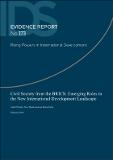| dc.contributor.author | Poskitt, Adele | |
| dc.contributor.author | Shankland, Alex | |
| dc.contributor.author | Taela, Katia | |
| dc.coverage.spatial | Brazil | en |
| dc.coverage.spatial | China | en |
| dc.coverage.spatial | India | en |
| dc.coverage.spatial | Russia | en |
| dc.coverage.spatial | South Africa | en |
| dc.date.accessioned | 2016-02-22T14:05:13Z | |
| dc.date.available | 2016-02-22T14:05:13Z | |
| dc.date.issued | 2016-02 | |
| dc.identifier.citation | Poskitt, A.; Shankland, A. and Taela, K. (2016) Civil Society from the BRICS: Emerging Roles in the New International Development Landscape, IDS Evidence Report 173, Brighton: IDS | en |
| dc.identifier.uri | https://opendocs.ids.ac.uk/opendocs/handle/20.500.12413/9025 | |
| dc.description.abstract | There is a burgeoning literature on the (re)emergence of the BRICS countries – Brazil, Russia, India, China and South Africa – as significant actors in international development. To date, however, most attention has focused on the government-to-government relations established through state-led South–South Development Cooperation (SSDC) and the BRICS’ engagements in multilateral processes. Much has also been written about the growing presence of businesses from the BRICS (especially China) in poorer countries, particularly in Africa, and the somewhat tendentious and superficial slant that initially characterised much of this work is now starting to give way to a more nuanced analysis of the multiple roles played by such businesses in different places and sectors (Brautigam 2009; Mohan 2013; Navas-Alemán 2015). By comparison with this growing literature on governments and businesses, remarkably little attention has been paid to the roles played by civil society actors from the BRICS countries by researchers from outside those countries themselves. In this report we will argue that this has led to a neglect of both their existing and their potential contributions to the ongoing transformation of the field of international development, amid the broad geopolitical shifts symbolised by the rise of the BRICS.
This report focuses on ‘civil society’ in just one of the many senses in which the term is used: the sense summarised by Edwards (2009) as referring to ‘the world of associational life’ (rather than alternative conceptualisations of civil society as ‘the good society’ or ‘the public sphere’). We are particularly interested in a fairly limited subset of the collective actors who populate this ‘world of associational life’ in the BRICS countries: that is, formally structured civil society organisations (CSOs) with a history of engagement in project implementation, policy dialogue and/or public debate in relation to issues of social and economic development at home and abroad. | en |
| dc.description.sponsorship | UK Department for International Development | en |
| dc.publisher | IDS | en |
| dc.relation.ispartofseries | IDS Evidence Report;173 | |
| dc.rights.uri | http://creativecommons.org/licenses/by/3.0/ | en |
| dc.title | Civil Society from the BRICS: Emerging Roles in the New International Development Landscape | en |
| dc.type | IDS Evidence Report | en |
| dc.rights.holder | IDS | en |
| dc.identifier.ag | OT/11009/5/1/3/157 | |


